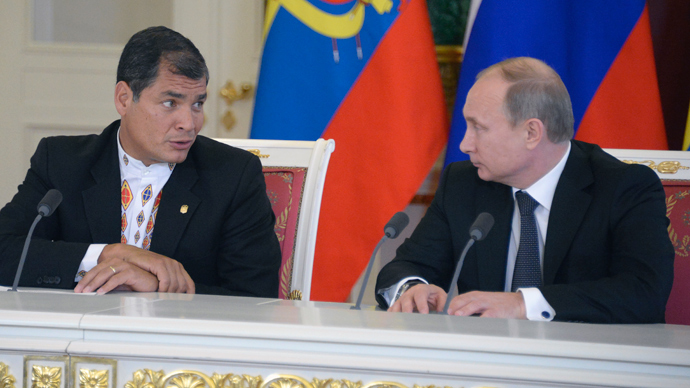Ecuador’s Correa in Moscow amid reheated NSA debate

Ecuador's president, one of the most vocal critics of Washington’s spying methods, has met for talks with Vladimir Putin in Moscow. His visit follows new NSA revelations which have brought US surveillance and Edward Snowden into the spotlight yet again.
After the Tuesday meeting, Rafael Correa – supporter of former
CIA employee and NSA contractor Edward Snowden – said that his
country follows the principles of international law and “does
not trade in human rights.”
Correa reiterated that Ecuador will consider granting political
asylum to whistleblower Snowden should he make such a request.
“If Snowden comes to the territory of Ecuador, for example,
and goes to the diplomatic mission, we will accept his request
and consider all the legal aspects to make a decision,”
Correa said.
"We act primarily in compliance with our principle, not in
compliance with conveniences," he added.
Though Ecuador’s economy largely depends on exports to the US,
Rafael Correa has not shied away from being openly critical of
Washington’s tactics. His leftist government declared it would
not change its mind about offering Snowden asylum, even if it was
threatened with sanctions.
“At first they said it was necessary for fighting
against terrorism. I don’t know if Angela Merkel is a terrorist.
I think it is clear they used surveillance programs for economic
reasons, for helping their transnational companies,” he told
RT Spanish. He was referring to the latest leaks - according to
which the NSA had an ear to the phones of 35 world leaders,
including the German chancellor.

Ecuador’s president also said the NSA scandal revealed double
standards in global politics, as Correa believes that any other
country would have been put on international trial for such
large-scale spying.
“But in this case nothing is going to happen, because
international justice, as in the Chevron case, still does not
work. And until now, justice works only for the convenience of
the stronger. In this case, the stronger is the USA,” Correa
said.
In June 2012, Ecuador granted asylum to Julian Assange - yet
another whistleblower wanted in the US. Correa believes European
countries could actually help end his confinement at the
Ecuadorian embassy in London.
“It’s now totally up to Britain, Sweden and Europe to resolve
the situation. Britain is quite capable of granting a safe
passage from the country to Assange, just the way it should
do,” he said.
Latin American leaders have from the very start refrained from
concealing their irritation over US surveillance practices and
were much more vocal in their condemnation than their European
counterparts.
The July visit of Bolivian President Evo Morales to Russia
resulted in a major international scandal when his plane was
denied airspace and forced to stay for 12 hours in Vienna. Correa
then reacted by urging other South American leaders to “take
action.” Through his Twitter account, the president said the
situation was a test for all Latin American states to see if they
had “graduated from the colonies.”
Ecuador, Russia discuss future plans
Correa and Russia’s President Putin have discussed a range of
issues including mutual trade, which reached a record-breaking
$1.3 billion in 2012.
The two countries have several ongoing energy sector projects,
including Ecuador’s proposal to Russian energy giant Gazprom to
create an alliance with Ecuador’s Petroamazonas. The Latin
American country wants to develop its own natural gas reserves
instead of buying liquid gas from abroad, as it is doing now.
“Of course we are interested in the participation of Gazprom,
as it is the largest gas company in the world,” said Correa
on Tuesday.
Currently, Russian companies are already taking part in another
energy project - the construction of the Toachi-Pilaton
hydroelectric plant, at a cost of over $1 billion.
Correa has also stated that Ecuador is interested in buying
Russian military transport in the form of Mil Mi helicopters and
trucks.
He also expressed hope that Ecuador’s parliament will ratify the
agreement with Russia in the nuclear sphere.
“In Ecuador this document has caused a lot of noise, but it
still has not been ratified. This agreement is primarily aimed at
the exchange of knowledge and technology. This does not mean that
it is aimed at the construction of nuclear power plants,"
Correa said.
Correa, who on Monday visited St. Petersburg, called on the
city’s scientists to visit Ecuador and participate in the
creation of a science city, specializing in bio- and
nanotechnologies, information systems, and the textile industry.
The Ecuadorian President is also expected to visit Russia’s IT
hub in Skolkovo.














